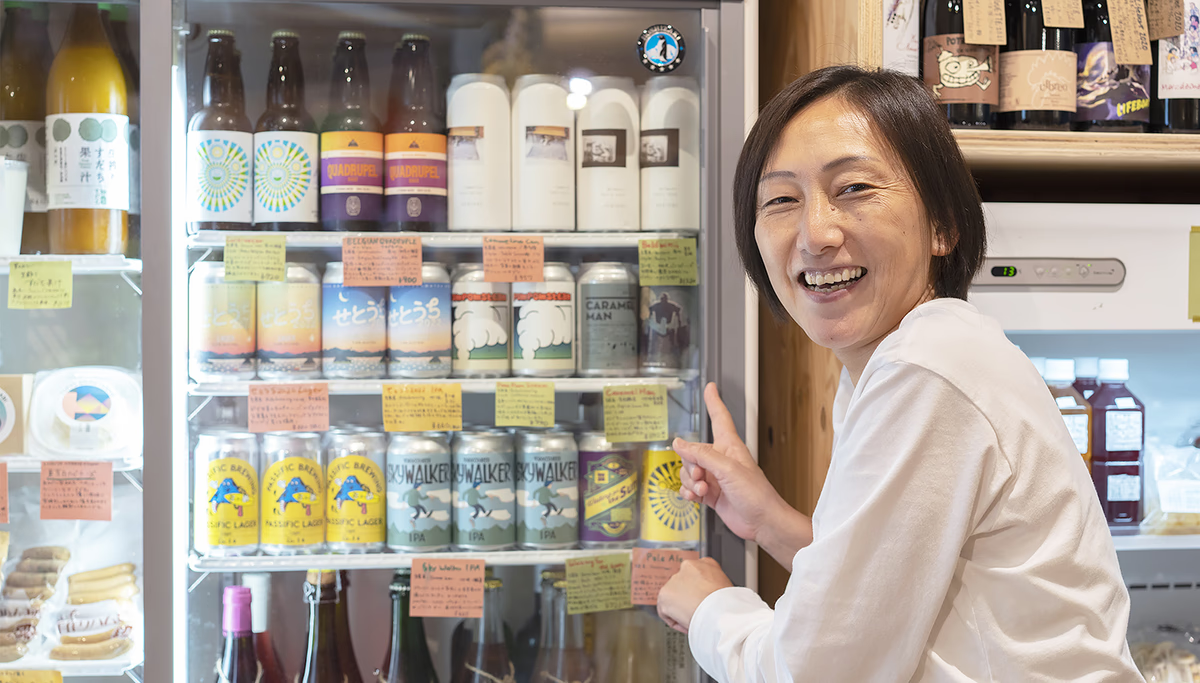こんにちは。京都在住のライター・杉本です。
ひさしぶりに代々木オフィスを訪ねると、パン屋塩見とFarmMart & Friendsがお客さんでにぎわっていて、モノサスの新しい風景が育ちはじめているのを感じました。
「自由と責任 みんなの制度と働き方実験室」は、フルフレックス&フルリモートで働く、モノサスメンバーのワークスタイル、会社に対する考え方や仕事観を聞くインタビューシリーズです。今回、登場していただくのはモノサスのバックオフィス業務を一手に担う本部の大久保千賀子さん。ものさすサイト事務局の滝田怜子さんとふたりでお話を伺いました。
やったことのない仕事ばかりだから面白い
杉本:大久保さんは、モノサスに入社してから今までどんなお仕事を?
大久保:2012年6月に入社したので、今年で10周年を迎えます。当時、子どもの保育園が変わって、早く帰らなければいけなくなって転職を考えていたとき、応募した一社目がモノサスでした。最初は、村上さんと同じ品質管理部にいました。主にチェックとコールセンターの仕事をするけれど、なんでもやるよって書いてあって。なんでもやるほうが好きだったので入ったって感じです。その後、コールセンター業務がなくなったとき、柵山さんに「本部の仕事やらない?」って声をかけられました。もともと、新卒からずっとバックオフィス系の仕事をしていたので、それならいいかと思って今に至るって感じです。
杉本:バックオフィスって、実はその会社の文化が現れるところだと思います。モノサスのバックオフィスはどうですか?
大久保:仕事内容は、総務・法務・経理・人事みたいな感じです。たとえば総務だったら、新型コロナウイルスの対応や社員の福利厚生、社内ネットワークのセキュリティ対策、社内イベントづくり、オフィスの施設管理や庭木の剪定依頼などもありますね。法務では、新しい案件がはじまるときに業務委託契約の締結のために司法書士さんとやりとりしたり、経理では会計事務所さんに経費清算や請求書の処理をとりまとめてお願いしたり。人事では、採用面談や入社後のフォローアップ面談、入社・退職手続き、就業規則の改定や社員の出産や結婚のときの手続きなんかもありますね。
杉本:お仕事の内容が、ものすごく多岐に渡っていますね。
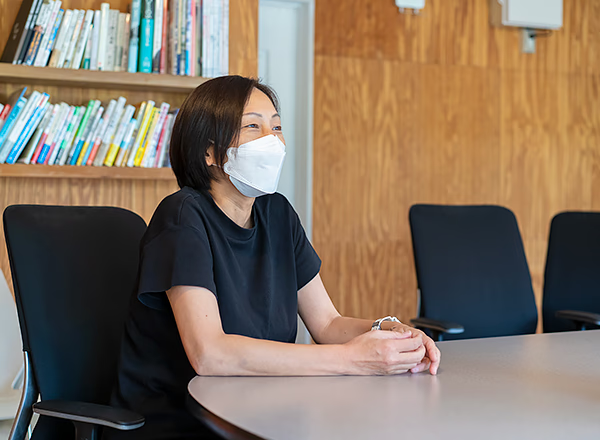
大久保:だから飽きないんです。本当にいろんな球が投げられてくるからね(笑)。柵山さんとも話していたんですけど、Aという球を投げられて「やったことないぞ!」とそれに必要な筋肉を鍛えて、「よーし、今度Aが来たら万全だぞー!」と思っていたら、次はBという球が投げられる。「えっ、B?じゃあ、こっちの筋肉も鍛えたし、AもBも来ーい!」と思っていても、AもBも二度とは来なくて応用はきかない。どんどんあちこちの筋肉が鍛えられていくの。
滝田:たしかに、モノサスってそうかもしれない!初めてのものばかり受け入れるのがしんどい人もいると思うのですが、大久保さんたちはいつも受け入れてくれますよね。どうしてなんですか?
大久保:知らないことを知りたいじゃん。知らなかったことを知るのは楽しいし、自分の身になっていくからね。飽きないなあって思います。
フルフレックス&フルリモートで会社はどう変わったか?
杉本:本部のお仕事は、フルフレックス&フルリモートになってどう変化しましたか。
大久保:けっこうリモートワークはしています。ただ、どうしても紙で契約を結びたい会社さんがあるし、郵便物が届くので、本部のメンバーはお互いに都合を合わせて会社に来ています。私は、出社するときは9時から、リモートワークのときは8時くらいから仕事をはじめて、遅くまで仕事をしていることが多いですね。
杉本:やっぱり、仕事の量が多いんですね。
大久保:そうですね。社食研の事業がはじまって新しい社員も増えましたし、これからもどんどん増えていくので、本部での採用も進めているところです。Webの人たちと社食研の人たちは働き方も違っていたりするので、クラウド上で管理している勤怠システムで設定する勤務体系が複雑になります。そこはちょっと難しいところもあります。
杉本:働く時間と場所が自由になって、会社全体としての変化は感じますか?
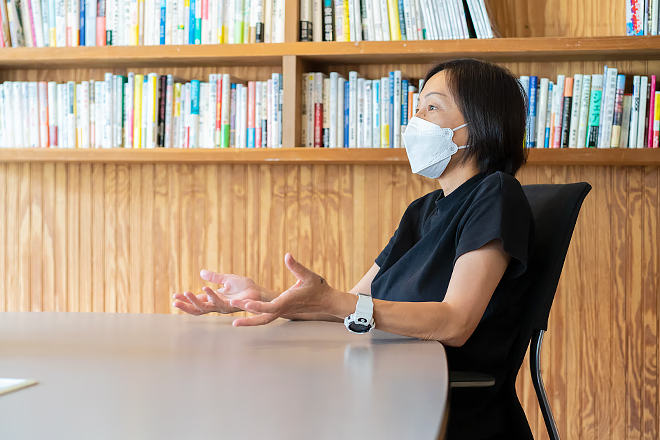
大久保:エンジニアの人たちは、働く時間を選べるようになって集中して働いている感じがします。朝型の人が早朝5時に来て、午後2時くらいに明るい日差しのなかで「おつかれさまでーす」って帰っていくのを見ると、「選択肢があるのはいいんじゃない?」って思います。
杉本:社員の動きが自由になればなるほど、会社全体のお世話をしている本部の人のお仕事は複雑になるし、投げられる球の種類も増えていくし「いいかげんにして!」って思ったりはしないんですか?
大久保:やれないことはやれないからね。続いているから、結論としてはこの仕事が性に合っているんだと思います。
滝田:いろんなところから仕事がわーって来ているはずなのに、いつもニコニコしていて、それどころかみんなのこともニコニコさせる大久保さんの力は本当にすごいです。
大久保:そんなこと言ってくれるの? 滝田さん、ありがとう(笑)。
大久保さんがいつもゴキゲンでいられる秘訣
杉本:大久保さんについては「いつも機嫌がいい人」という噂を聞いています。機嫌よく仕事を続けられるのはどうしてですか?
大久保:常に、仕事を楽しもうと心がけていて、もうそれが習慣になっているのかも。昔、母に「時間だけはみんなに平等に過ぎていってしまうから、同じ1時間でも『つまんない』と思って過ごすよりも、『楽しいな』と思って過ごしたほうがいいよ」って言われたことがあるんです。その通りだと思っています。あとはやっぱり、働いているメンバーが楽しいからっていうのはありますね。
杉本:仕事をしていて難しいなと思うのはどんなときですか。
大久保:理想と現実の妥協点を探るところかな。たとえば、従業員のためにやりたいことがあるときに、予算やいろんな条件との兼ね合いのなかで、ちょっとあきらめないといけない部分があるときに、どこで決着をつけるか?とか。あるいは、社内イベントに全員参加してほしいけど、参加したくない人の気持ちも尊重したい。全員強制参加っていうのはモノサスっぽくないし、参加のハードルを低くするためにがんばるけれど「ここまでやってダメならいいか」と妥協するみたいなことかな。イベント大好きなので、なんでもみんなでやりたいんです(笑)。
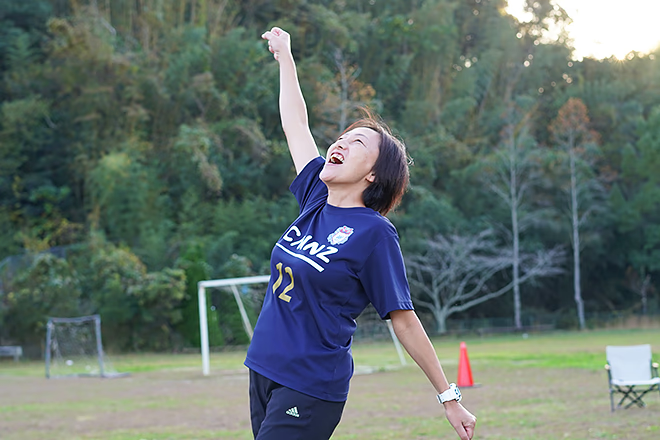
運動会で元気いっぱいな姿を見せる大久保さん
杉本:2021年11月、「運動会を一番がんばった!」でMVPを受賞されていましたね!大久保さんは、社員全員と関わるという独自のポジションですよね。新しいメンバーにとっては最初に出会う「会社の人」だし、社歴の長い「先輩」ではあるけれど直属の上司ではない。社内でのご自身の立場や役割はどう考えていますか?
大久保:んー、あまり考えたことはないけど、「ななめの関係」というかね。新入社員との関わりで言えば、今までは採用した人は各部署にお任せしていたけれど、去年ぐらいから本部でフォローしていこうという流れができていて。1ヶ月、3ヶ月、半年、1年と定期的なフォローアップ面談を本部でするようになったんです。
面談では、事前に回答してもらったフィードバックシートを確認しながら、1時間たっぷり話すんですけど、大事な話もムダ話もいっぱいできて楽しいですね。この体制が定着すれば、何か問題を抱えたときも、「大久保さんに言えばなにか変わるかも?」と思ってもらえる立ち位置になれるかもしれない。上長には直接言えないことを本音で話せる「駆け込み寺」みたいな立場になれるといいなと思います。
杉本:大久保さんにとって、モノサスのメンバーはどんな存在なんですか?
大久保:子どもみたいな感じですね。母として「だいじょうぶ?」「みんな、生きてる?」って気になってしょうがないんです。
今は「モノサスらしい採用ってなんだろう?」を考えている
杉本:今、お仕事のなかで特に力を入れているのはどんなことですか?
大久保:人事や採用の部分ですね。以前は、各事業部ごとに媒体に採用情報を出して、自分たちで面接から採用まで決めていたんです。ところが、2年前から3〜7人のユニット制になったので、少ない人数のなかで採用をやりきれないことが課題になっていました。そこで、本部でまとめて採用を担当することになったのですが、1年やってみて改めて「モノサスらしい採用ってなんだろう?」と考えはじめています。
今は「モノサスらしい採用をするには、どういうところを見たらいいんだろう」「そもそも『モノサスらしさ』ってなんだろう?」という共通の認識をもったうえで、それぞれのビジネスが求める人を採用するほうがいいよねというような話をしています。まさに、ユニット・リーダーやビジネス・オーナーの有志が集まって議論がはじまったところですね。
杉本:ものさすサイトでいろんな人に話を聞くと、みなさんのなかに「モノサスらしいってこういうことだよね」という、言語化されずに共有されている何かがあるのを感じています。それに、モノサスの人ってすごく「人間」って感じがあって「会社」っぽくない。わたしのことも「ライターさん」ではなく「杉本さん」として出会ってくれるのがうれしいです。
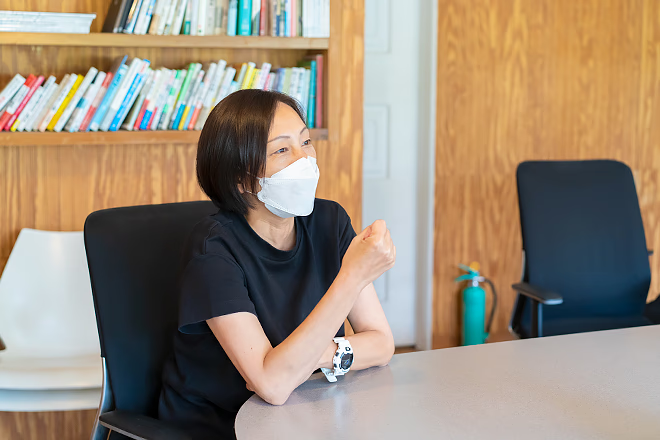
大久保:人間味があるっていうことかな?それはわかるね。
滝田:わかります(笑)。生モノっぽいかも。前の会社にいた時は「アパレル、店員です!」みたいな感じだったけど、モノサスの人たちとは長時間いっしょにいるし、武装しているのがだんだん無理になってくる。ノー・ヘルスのときも「あいつ、ヘルス0だから話しかけないでおこう」ではなく、「どうしたの?大丈夫?」って入って来てくれる人が多いから、全部見せてる感じになってくるんですよね。
大久保:そういう人が多いから、気取る必要がないんだよね。なるほど、だから私たちはだんだん居心地が良くなってきているわけだ。気取ってる人がいないしね。
杉本:そんなモノサスで働く大久保さんにとっての仕事ってなんですか?
大久保:1日の半分以上仕事しているから、人生じゃないけど、生きるのとイコールじゃないかなって思う。半分以上それで過ごしているんだから、嫌いなことはやりたくないし、楽しんでるんじゃないかな。
杉本:これからモノサスで、あるいは個人として「やりたいな」って思っていることはありますか?
大久保:本当においしいビールがつくりたい!今年も児島いずみさんと一緒に探求型プロジェクトを申請してOKをもらいました(去年のものさすビールのレポート)。今度は、一度飲んだら忘れられないがつんと個性的な味のビールを、11月の周年に間に合うようにつくろうとしています。レシピを完成させたら、それをつくってくれるブルワリーに持ち込んで、いつかはFarmMart&Friendsで売ってもらえるようになりたいです。
杉本:おいしいビール、たのしみにしています!
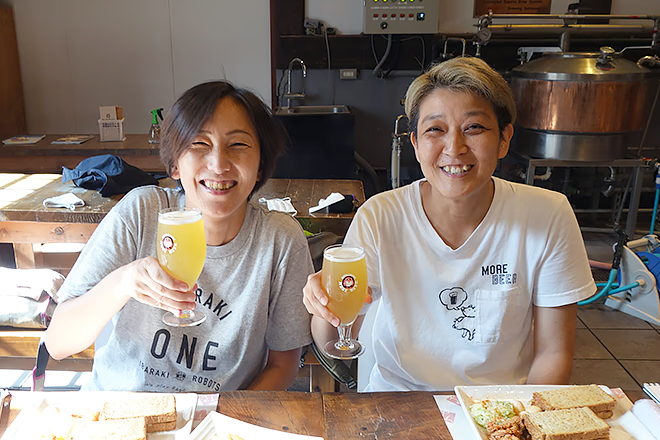
モノサスのビールづくりチーム、大久保さんと児島さん。今年はどんなお味でしょうか?
「大久保さんは、いつ会っても何かほめてくれる」と誰かに聞いたことがあります。お仕事の内容を聞いて「みんな好き勝手な球を投げてきて、もう!ってイライラしても不思議じゃないですよ?」と言ってみたら、「そんなこと思ったことはない!」とびっくりされて、わたしもびっくりしました。仕事を「楽しむ」って意外とむずかしい。そして、仕事を楽しんでいる人って本当にかっこいいなと思いました。大久保さん、ありがとうございました!
